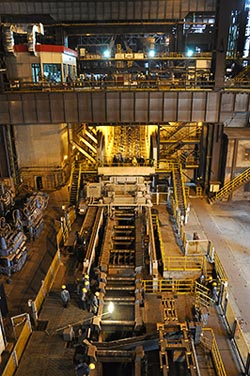Second continuous slab caster from Siemens enters service at JSW Steel

Continuous slab caster no. 4 at JSW Steel in Toranagallu, India <br>
The new continuous slab caster No. 4 from Siemens Metals Technologies entered service in August at the Toranagallu steelworks operated by Indian steel producer Jindal South West Steel Ltd. (JSW Steel).
The single-strand caster installed in Steelworks No. 1 has an annual production capacity of 1.4 million metric tons of slabs, thereby increasing the total casting capacity of Steelworks No. 1 to 4.2 million metric tons.
Like continuous slab caster No. 3, also supplied by Siemens, the new caster is equipped with the DynaGap Soft Reduction system. The resulting high internal quality of the slabs is the basis for producing high-quality steel tubes up to X65 in accordance with the API (American Petroleum Institute) standard, as well as other micro-alloyed steels.
At Steelworks No. 1 in Toranagallu in the Indian state of Karnataka, JSW Steel now operates four continuous slab casters. Casters No. 1 and No. 2 have been in operation since 1999 and were modernized by Siemens a few years ago. Caster No. 3 has been in operation since late 2006 and was the first plant in India in 2009 to be equipped by Siemens with DynaGap Soft Reduction technology.
The new caster No. 4 is part of an ongoing expansion program at JSW Steel. With a machine radius of eight meters, it has a metallurgical length of 35 meters. Presently, slabs are cast with a thickness of 220 mm and widths ranging from 800 to 1,600 mm. The machine has a design range for future slab thicknesses of up to 260 mm. The maximum casting speed is two meters per minute. Thanks to DynaGap Soft Reduction, slabs can be cast from high-grade steel tube grades such as X65 according to the API (American Petroleum Institute) standard, as well as other micro-alloyed steels.
The design and equipment of the new continuous slab caster are similar to those of continuous caster No. 3, which simplifies operation, maintenance and spare parts management. Continuous caster No.4 is equipped with EN 14753 safety features. Smart Segments are used to contain the strand, which were manufactured in Siemens workshop facilities. A number of technological packages ensure an optimum casting process, producing slabs with both high surface and internal quality. These include the Mold Expert breakout prediction system, the LevCon mold level control, the DynaFlex mold oscillator and the Quality Expert inline quality assurance system. Siemens also supplied the complete basic and process automation systems.
Follow us on Twitter: www.twitter.com/siemens_press
The Siemens Industry Sector (Erlangen, Germany) is the world's leading supplier of innovative and environmentally friendly products and solutions for industrial customers. With end-to-end automation technology and industrial software, solid vertical-market expertise, and technology-based services, the Sector enhances its customers' productivity, efficiency, and flexibility. With a global workforce of more than 100,000 employees, the Industry Sector comprises the Divisions Industry Automation, Drive Technologies and Customer Services as well as the Business Unit Metals Technologies. For more information, visit http://www.siemens.com/industry
The Metals Technologies Business Unit (Linz, Austria), part of the Siemens Industry Sector, is one of the world's leading life-cycle partners for the metals industry. The Business Unit offers a comprehensive technology, modernization, product and service portfolio as well as integrated automation and environmental solutions covering the entire life cycle of plants. For more information, visit http://www.siemens.com/metals
Reference Number: IMT201312518e
Contact
Mr. Rainer Schulze
Metals Technologies
Siemens AG
Turmstr. 44
4031 Linz
Austria
Tel: +49 (9131) 7-44544
rainer.schulze@siemens.com
Media Contact
More Information:
http://www.siemens.com/metalsAll latest news from the category: Corporate News
Newest articles

NASA: Mystery of life’s handedness deepens
The mystery of why life uses molecules with specific orientations has deepened with a NASA-funded discovery that RNA — a key molecule thought to have potentially held the instructions for…

What are the effects of historic lithium mining on water quality?
Study reveals low levels of common contaminants but high levels of other elements in waters associated with an abandoned lithium mine. Lithium ore and mining waste from a historic lithium…

Quantum-inspired design boosts efficiency of heat-to-electricity conversion
Rice engineers take unconventional route to improving thermophotovoltaic systems. Researchers at Rice University have found a new way to improve a key element of thermophotovoltaic (TPV) systems, which convert heat…



